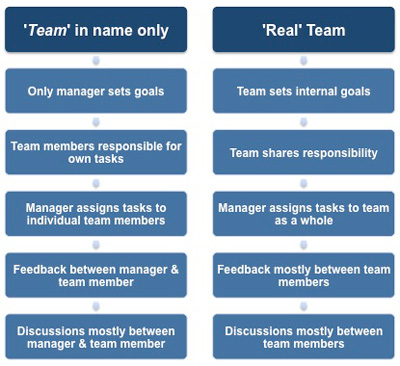Different Types of Teams
A 'real' team is a group of people who are working together synergistically to achieve something. This type of working is typified by project teams in which individuals who have complementary skills work together to achieve something that none of them could do individually.
However, some organizations use the word 'team' as a collective noun to refer to any group of workers that perform a similar task. For example, an organization may refer to the 'Accounts Receivable Team,' to mean those people in the accounts department who chase late payments. In this case, these people all perform a similar role but they do not interact with each other very much and their work is done quite independently. Each 'team member' has a list of customer invoices that have not been paid and that they are expected to chase payment for.
When a group of workers are performing this type of work but the organization still insists on referring to them collectively as a team, you should consider them to be a 'team in name only' as opposed to a real team.
 |
These differences are also evident when you look at the responsibilities of individual team members. For those in the Accounts Receivable Team each person is responsible only for their own individual tasks. Project team members, on the other hand, are accountable to each other for getting their own particular deliverables completed.
There is also a marked difference in the occurrence of conflict within these two teams. In the Accounts Receivable Team, conflict is rare because team members work independently. In contrast, the project team experiences a lot of internal disagreement about the best way to tackle certain parts of the project. This conflict is viewed as normal and understandable due to the nature of the work and interactions between the team members.
There are other types of team that could be placed somewhere in between 'teams in name only' and real teams like a project team. You can save yourself a lot of frustration by recognizing that the closer a team is to being a 'team in name only,' the less scope there is to apply team building principles.
You may also be interested in:
Team Building in the Workplace | Team Building Principles | Project Team Example | Support Team Example | Steering Team Example.
|
|
 |


